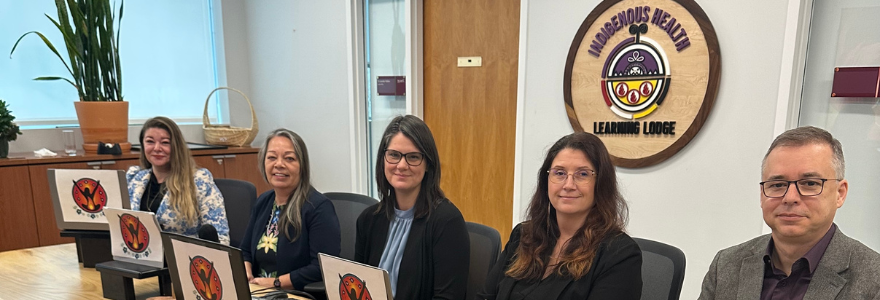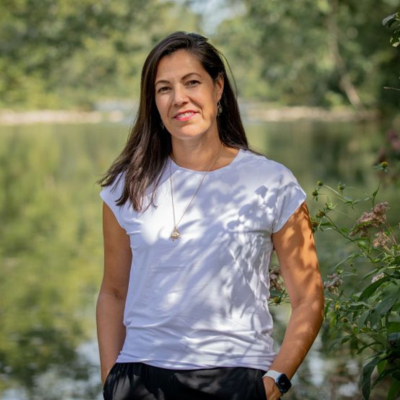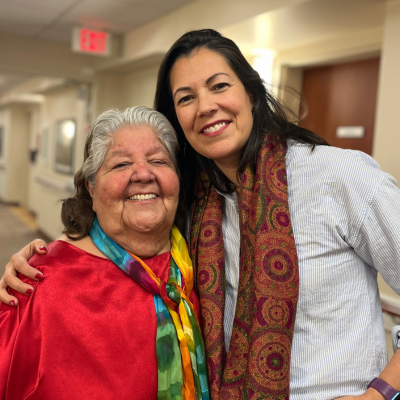News and Updates
Contact
Faculty of Social Science
Social Science Centre
Room 9438
Western University
T. 519-661-2053
F. 519-661-3868
E. social-science@uwo.ca
Advancing Culturally Safer Indigenous Brain Health Assessment: Chantelle Richmond’s Role in Transformative Research
May 07, 2025By Diana Corredor NFRF Panel of jurors (Maliah LeBlanc)
NFRF Panel of jurors (Maliah LeBlanc)
A groundbreaking Indigenous-led initiative is set to reshape the landscape of brain health research, and Western University’s Chantelle Richmond will play a key role in the work. As a Canada Research Chair, jointly appointed with Indigenous Studies and co-chair of the Indigenous Faculty Advisory Council, Richmond brings both academic expertise and personal experience to the project.
 Richmond is a co-investigator on a newly funded $24-million research initiative through the New Frontiers in Research Fund (NFRF) Transformation Stream Competition. Awarded to Dr. Jennifer Walker (McMaster University) and Edith Mercieca (Maamwesying North Shore Community Health Services), this community-led project brings together diverse Métis, Inuit and First Nation communities, organizations and scholars dedicated to improving brain health assessment for Indigenous people.
Richmond is a co-investigator on a newly funded $24-million research initiative through the New Frontiers in Research Fund (NFRF) Transformation Stream Competition. Awarded to Dr. Jennifer Walker (McMaster University) and Edith Mercieca (Maamwesying North Shore Community Health Services), this community-led project brings together diverse Métis, Inuit and First Nation communities, organizations and scholars dedicated to improving brain health assessment for Indigenous people.
At the core of the project is the development of a culturally safe, trauma-informed bundle of dementia assessment tools designed specifically for Indigenous communities across Canada and beyond. This initiative responds to alarming projections from the Alzheimer Society of Canada’s 2024 Landmark Study, which estimates a 273 per cent increase in Alzheimer’s cases among Indigenous populations by 2050—far exceeding the 187 per cent increase projected for the general Canadian population.
 For Richmond, this work is deeply personal. As an Indigenous health scholar, she has dedicated her career to examining how place and environment influence health. Now, she approaches the research not only as a scientist but as a daughter whose mother is living with dementia. Her dual perspective enriches the project, ensuring that it is both scientifically rigorous and grounded in lived experience.
For Richmond, this work is deeply personal. As an Indigenous health scholar, she has dedicated her career to examining how place and environment influence health. Now, she approaches the research not only as a scientist but as a daughter whose mother is living with dementia. Her dual perspective enriches the project, ensuring that it is both scientifically rigorous and grounded in lived experience.
This initiative is more than a research study—it is a vital step toward health equity for Indigenous people. By developing tools that are culturally relevant and responsive, this team are ensuring that Indigenous communities have access to dementia assessments that reflect their values, traditions, and lived realities.
Indigenous leadership and community guidance on this initiative offers potential to not only transform brain health assessments but also to serve as a model for community-driven research in Canada and internationally. As the project progresses, its impact will be felt far beyond academic circles—it will empower Indigenous communities with the knowledge and resources to navigate brain health in ways that honour their traditions and lived experiences. In doing so, Richmond and her collaborators are paving the way for a more inclusive and responsive approach to dementia care in Canada and beyond.

